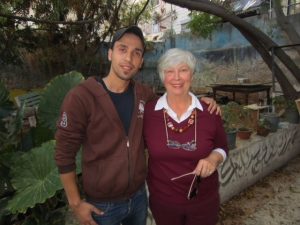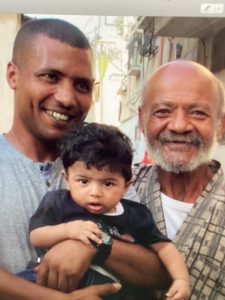My Path to Helping Refugees
by Rev Adele BoyRefugee. The word conjures up many images from around the globe. Images of women fleeing the Taliban and of leaky rafts bearing scared people, young and old, escaping hopeless lives across the Mediterranean.My own awareness of and path to working with refugees started early in life as a young teacher in the Toronto District School Board. Wherever in the world there were upheavals and wars, a wave of refugees would be welcomed into school classrooms, from Nigerians, escaping Civil War, to Vietnamese boat people, to Romany people, to Syrians and Yemenis, and more recently Afghans and Ukrainians. The details of the individual stories, all unique, yet the situation of being hunted, homeless and alone, was very much the same.

Rev Adele Boy and her driver in the EA program in Palestine.
In 2018, I represented the United Church of Canada as an Ecumenical Accompanier (EA) in a program supported by 21 countries around the world. I was stationed in Tulkarem, Palestine working as a human rights monitor on the ground for three months. My task was multipurposed. One of the tasks was to accompany Palestinians in their everyday lives to access livelihood, education, and worship through the border walls and gates that Israel has set up and requires Palestinians to use. Many of the Palestinians lived in refugee camps displaced by Israel’s settlement vision.In the three months I lived in Tulkarem, I worked in two refugee camps in the city. The poverty, squalor, lack of sanitation, food deprivation, and cases of PTSD were shocking. There were four, perhaps five generations of Palestinian families, still living in the same refugee camp, waiting to return to their original homes, I was privileged to work with many female leaders who strive to better the lives of each other and their children. I was both inspired and humbled by their strength and dedication and resilience.As an EA, my fellow monitors and I had a driver to ensure our safety and conduct us easily from village to village. Our driver lived in one of the refugee camps. He shared much about his family, his life and his hopes all the while, taking great care to do his job exceptionally well. We were also very aware of the shame he felt at not being able to offer the culturally customary hospitality of a simple invitation to share a meal with his family because of his embarrassment of where he lived. He felt shame about the situation over which he had no control. Our casual talk of Canada started with “would I have to live in a camp?” I not only saw how little refugee camps have to offer, but also how much they take away.

Three generations living in a refugee camp.
Since my return in 2019, I have been spurred on to raise funds for school supplies and to support a daycare in one of the refugee camps where I worked. I have offered webinars for the Eastern Central Ontario region of the United Church with a Palestinian farmer, offering opportunities to learn about organic farming and Dar Qandil Community Centre for the Arts (offering ideas through the arts on how to foster learning , self-confidence and fun for mainly refugee children). I continue to work in this regard.During the Syrian war, my own town of Uxbridge, through the work of several churches, sponsored some Syrian families. Out of this work, a separate group has formed to work toward the reunification of relatives from Syria. This past month, nine family members were welcomed into the town, to the delight of their families. I have developed a close relationship with one family and continue to support them in practical ways.Recently I have turned to the plight of Afghan Hazara refugees, who have been forced to leave their country by the Taliban. The tragedy the Hazara people, facing genocide of their people, mercilessly persecuted by the Taliban, touches me greatly.Many are living in camps in Indonesia not able to work, attend school or travel. Many have been living there in limbo for 5 to 10 years in spite of having a United Nations number and card making them eligible for a residence in a third country. The Canadian government pledged 40,000 people would be supported in coming to Canada. Today Canada is nowhere near honouring that commitment. Canada has, however, created the opportunity for private citizens to be involved in sponsorship, opening the door for people abroad to have a new life.To that end, I am involved in a group which has been formed to sponsor a refugee to come to Canada and we are in the fundraising stage. The Canadian government suggests a minimum of $16,500 as an amount needed to sponsor such a programme. I am grateful for the Clergy Memorial Church’s support in the form of a micro-grant to assist in this project. Donations are being accepted by e-transfer at G5Afghanmission25@gmail.com.

Recently sponsored, an Afghan woman cooks in her new Canadian home.
There are many people in organisations in Canada doing this work. Saint Paul’s Cathedral in Toronto has an active refugee committee on which I sit as a community member. They do marvelous work and are presently supporting three different families to settle in the Toronto area.Being part of such groups can be time consuming, sometimes frustrating, but always rewarding. When one welcomes a newly-arrived sponsored person at the airport and wraps them in the Canadian flag, it is all worth it. Our most recent young woman arrived by herself. Her comment was “this has to be a dream.” I would encourage anyone to become involved with a sponsorship group through churches or privately start a G 5 group of their own. The reward is great. When I reflect on my path, I see that I have been able to offer opportunities and hope for a better world.

